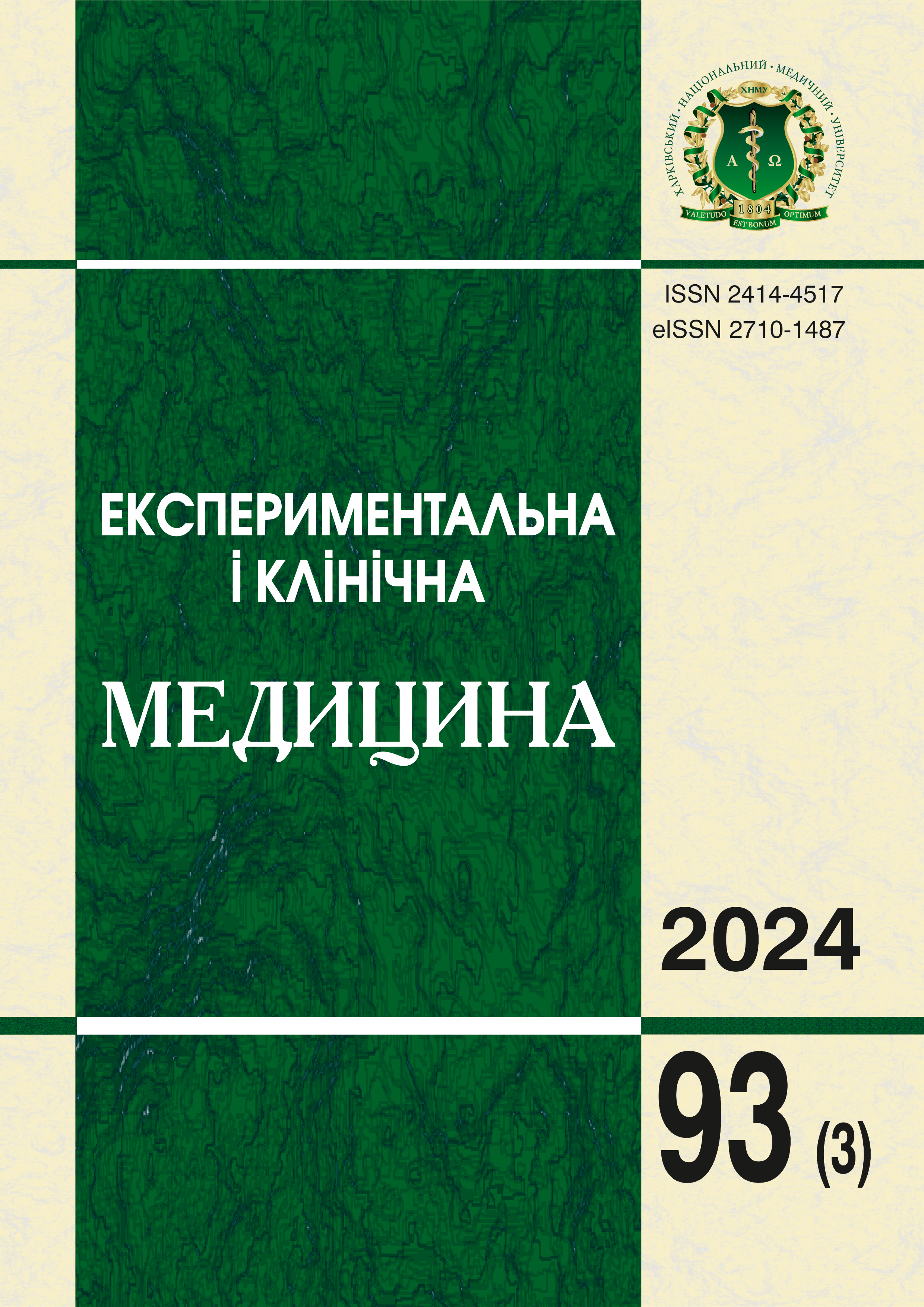Abstract
The purpose of the study was to analyze professional literature sources devoted to the influence of the role of physical activity in increasing resistance to aging. The impact of physical exercises on increasing the resistance of the elderly to the aging process is considered. Bibliosemantic and analytical methods were used in the study. The analysis of the specialized literature (22 sources) was carried out using information in the scientific-metric databases MEDLINE/PubMed, Scopus and Google Scholar. Demographic changes and the aging of the world's population require more effective methods of combating the growing prevalence of chronic diseases that make the elderly dependent on drugs and assistance. Physical activity is a representative parameter of a person's health, as it plays an important role in the prevention of diseases, which is why it is necessary to widely promote it among the elderly. There is convincing evidence that physical activity is both a preventive and a therapeutic component of the strategy for preserving health and preventing neuropsychological pathology and disability in the elderly, including syndromes for which pharmacological treatment is either absent or even dangerous. Given that the beneficial effect of physical exercises is general, the inclusion of physical activity in rehabilitation programs is more appropriate and promising than pharmacological intervention, which is aimed at individual body systems. In order to optimize the functional capabilities of weakened elderly people, it is necessary to include in the training program exercises simulating everyday activities. Studies have proven that physical activity also has a positive effect on cognitive functions, promoting cerebral angiogenesis and increasing neurogenesis and cerebral blood flow, reducing the permeability of the blood-brain barrier, and increasing the supply of oxygen-rich blood to the brain. It is emphasized that long-term physical exercises are safe and effective for the elderly, the benefits of physical activity regardless of the place of residence, living conditions, concomitant pathology, physical or cognitive function of the person at the initial level.
Keywords: preserving health, training program exercises, cognitive functions, elderly people.
Archived: https://doi.org/10.5281/zenodo.14497201
References
Izquierdo M, Duque G, Morley JE. Physical activity guidelines for older people: knowledge gaps and future directions. Lancet Healthy Longev. 2021 Jun;2(6):e380-3. DOI: 10.1016/S2666-7568(21)00079-9. PMID: 36098146.
Beard JR, Officer A, De Carvalho IA, Sadana R, Pot AM, Michel JP, et al. The World report on ageing and health: a policy framework for healthy ageing. Lancet. 2016;387(10033):2145-54. DOI: 10.1016/S0140-6736(15)00516-4. PMID: 26520231.
Izquierdo M, Fiatarone Singh M. Promoting resilience in the face of ageing and disease: The central role of exercise and physical activity. 2023;88:101940. DOI: 10.1016/j.arr.2023.101940. PMID: 37127094.
Argyridou S, Zaccardi F, Davies MJ, Khunti K, Yates T. Walking pace improves all-cause and cardiovascular mortality risk prediction: A UK Biobank prognostic study. Eur J Prev Cardiol. 2020;27(10):1036-44. DOI: 10.1177/2047487319887281. PMID: 31698963.
Traverse HM, Horoshko VI. Physical activity as a prevention of aging loss of muscle mass. Rehabilitation and Recreation. 2022;(12):86-91. DOI: 10.32782/2522-1795.2022.12.12. [In Ukrainian].
Traverse G, Horoshko V, Danylchenko S. The Effect of Physical Activity on the Secretory Function of Muscles and Bone Tissue in Humans. Ukrainian Journal of Medicine, Biology and Sport. 2023;1(41):50-5. Available at: https://reposit.nupp.edu.ua/bitstream/PoltNTU/12356/1/jmbs0-2023-8-1-050.pdf
Cruz-Jentoft AJ, Bahat G, Bauer J, Boirie Y, Bruyere O, Cederholm T, et al. Sarcopenia: revised European consensus on definition and diagnosis. Age Ageing. 2019;48(4):601. DOI: 10.1093/ageing/afy169. PMID: 30312372.
Albujulaya N, Stevinson C, Piggin J. Physical activity policy in Saudi Arabia: analysis of progress and challenges. Int J Sport Policy Politics. 2023;16(4):609-24. DOI: 10.1080/19406940.2023.2228812.
Tunstall-Pedoe H. Preventing Chronic Diseases. A Vital Investment: WHO Global Report. Geneva: World Health Organization; 2005.
Fried LP, Cohen AA, Xue QL, Walston J, Bandeen-Roche K, Varadhan R. The physical frailty syndrome as a transition from homeostatic symphony to cacophony. Nat Aging. 2021;1(1):36-46. DOI: 10.1038/s43587-020-00017-z. PMID: 34476409.
Fulop T, Larbi A, Witkowski JM, McElhaney J, Loeb M, Mitnitski A, et al. Aging, frailty and age-related diseases. Biogerontology. 2010;11(5):547-63. DOI: 10.1007/s10522-010-9287-2. PMID: 20559726.
WHO guidelines on physical activity and sedentary behaviour. Geneva: World Health Organization; 2020. 104 p. Available at: https://www.who.int/publications/i/item/9789240015128
Cadore EL, Casas-Herrero A, Zambom-Ferraresi F, Idoate F, Millor N, Gómez M, et al. Multicomponent exercises including muscle power training enhance muscle mass, power output, and functional outcomes in institutionalized frail nonagenarians. Age (Dordr). 2014;36(2):773-85. DOI: 10.1007/s11357-013-9586-z. PMID: 24030238.
Garcia-Hermoso A, Ramirez-Velez R, Saez de Asteasu ML, Martínez-Velilla N, Zambom-Ferraresi F, Valenzuela PL, et al. Safety and effectiveness of long-term exercise interventions in older adults: a systematic review and meta-analysis of randomized controlled trials. Sports Med. 2020;50(6):1095-106. DOI: 10.1007/s40279-020-01259-y. PMID: 32020543.
Sparks LM. Exercise training response heterogeneity: physiological and molecular insights. Diabetologia. 2017;60:2329-36. DOI: 10.1007/s00125-017-4461-6. PMID: 29032385.
Zhidong C, Wang X, Yin J, Song D, Chen Z. Effects of physical exercise on working memory in older adults: a systematic and meta-analytic review. Eur Rev Aging Phys Act. 2021;18(1):18. DOI: 10.1186/s11556-021-00272-y. PMID: 34535084.
Ku YX. Cognitive and neural mechanisms underlying working memory. Sheng Li Xue Bao. 2019;71(1):173-85. DOI: 10.13294/j.aps.2019.0004.
Haeger A, Costa AS, Schulz JB, Reetz K. Cerebral changes improved by physical activity during cognitive decline: a systematic review on MRI studies. Neuroimage Clin. 2019;23:101933. DOI: 10.1016/j.nicl.2019.101933. PMID: 31491837.
Lin Y-S, Lin F-Y, Hsiao Y-H. Myostatin is associated with cognitive decline in an animal model of Alzheimer's disease. Mol Neurobiol. 2019;56(3):1984-91. DOI: 10.1007/s12035-018-1201-y. PMID: 29982981.
Lluva-Plaza S, Jimenez-Martin A, Gualda-Gomez D, Villadangos-Carrizo JM, Garcia-Dominguez JJ. Multisensory System for Long-Term Activity Monitoring to Facilitate Aging-in-Place. Sensors (Basel). 2023;23(20):8646. DOI: 10.3390/s23208646. PMID: 37896739.
Kim D, Bian H, Chang CK, Dong L, Margrett J. In-Home Monitoring Technology for Aging in Place: Scoping Review. Interact. J Med Res. 2022;11(2):e39005. DOI: 10.2196/39005. PMID: 36048502.
Izquierdo M, Duque G, Morley JE. Physical activity guidelines for older people: Knowledge gaps and future directions. Lancet Healthy Longev. 2021;2(6):e380-3. DOI: 10.1016/S2666-7568(21)00079-9. PMID: 36098146.

This work is licensed under a Creative Commons Attribution-NonCommercial-ShareAlike 4.0 International License.

